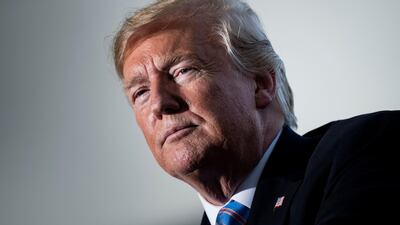Hours after threatening the “official end” of Iran if it starts a war with the United States, Donald Trump kept up his uncompromising rhetoric, vowing not to let Iran develop nuclear weapons.
"I don’t want to fight. But you do have situations like Iran, you can’t let them have nuclear weapons, you just can’t let that happen," Mr Trump said in an interview with Fox News late on Sunday.
British Foreign Secretary Jeremy Hunt warned Iran not to underestimate US resolve on the issue.
"They don't want a war with Iran. But if American interests are attacked, they will retaliate," Mr Hunt told reporters in Geneva. "And that is something that the Iranians needs to think about very, very carefully."
Before becoming US president, Mr Trump was a vocal critic of both the Iraq war and the Libya intervention. Last year, he pulled the US out of a comprehensive nuclear deal with Iran, an agreement that was designed to temporarily curb Iran's nuclear ambitions.
On Sunday, he said that “with all of everything that’s going on, and I’m not one that believes, you know, I’m not somebody that wants to go into war, because war hurts economies, war kills people most importantly, by far the most importantly”.
Mr Trump again took credit for ending the nuclear deal that his predecessor Barack Obama signed in 2015 and indicated that the strategy of isolation and sanctions is working by devastating the Iranian economy.
“I had no idea it was going to be as strong as it was ... the country is devastated from the standpoint of the economy," he said.
The US wants Iran to come to the table, and according to CNN, the White House has passed a phone number via Switzerland to Tehran. That call has not been placed yet.
There are growing concerns in Washington that if Iran backs away from its commitments under the nuclear deal in July, it could increase enrichment levels – capped under the 2015 agreement, officially called the JCPOA – to obtain a nuclear weapon.
Before his interview was aired, Mr Trump threatened Tehran that if it “wants to fight, that will be the official end of Iran”.
“Never threaten the United States again!” he said.
In an apparent response to Mr Trump's tweets, Iranian Foreign Minister Javad Zarif wrote, "genocidal taunts won't 'end Iran' ... try respect – it works".
Mr Zarif called Mr Trump a member of the "#B_Team", and said he wants to attempt to conquer Iran, like Alexander the Great and Genghis Khan, who both failed.
But Mr Hunt said Iran had to
Separately, Omani Foreign Minister Yousuf bin Alawi bin Abdullah visited Tehran on Monday to discuss regional issues with Mr Zarif. The small Gulf state has previously played a mediating role between Iran and the US and was a recipient of excess Iranian heavy water under the 2015 nuclear deal.
Muscat has been a crucial backchannel between Washington and Tehran since the 1980s. Iranian state media outlet Irna that reported the visit gave no details of the purpose and did not say if US-Iranian tensions were discussed.
The escalation in rhetoric comes as a rocket landed near the US embassy in Baghdad on Sunday, four days after Washington ordered the withdrawal of all non-essential staff from Iraq because of fears of attacks by Iranian proxies.
It also coincides with mounting tension in the Gulf of Oman with two US warships arriving in the region. Last week, two attacks, one sabotaging tankers at sea near the UAE and one against Saudi oil pumping stations near Riyadh, occurred within 48 hours of each other.
Saudi Arabia has accused Iran of ordering the drone attack through the Houthis, while the UAE is conducting an investigation into what happened off its coast.
Gulf states have also increased maritime patrols to deter Iran.

